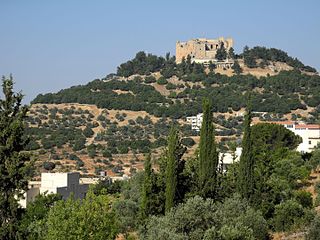
Antarah ibn Shaddad al-Absi, also known as ʿAntar, was a pre-Islamic Arab knight and poet, famous for both his poetry and his adventurous life. His chief poem forms part of the Mu'allaqāt, the collection of seven "hanging odes" legendarily said to have been suspended in the Kaaba. The account of his life forms the basis of a long and extravagant romance.
Shaddād, also known as Shaddād bin ʽĀd, was believed to be the king of the lost Arabian city of Iram of the Pillars, an account of which is mentioned in Sura 89 of the Qur'an. Various sources suggest Shaddad was the son of 'Ad al-Miltat ibn Saksak ibn Wa'il ibn Himyar.

Sinjar is a town in the Sinjar District of the Nineveh Governorate in northern Iraq. It is located about five kilometers south of the Sinjar Mountains. Its population in 2013 was estimated at 88,023. The town is one of the main settlement areas of the Yazidis and is also home to Sunni Muslim Arabs and Turkmens and Christians.

al-Malik al-Afdal Najm ad-Dīn Ayyūb ibn Shādhi ibn Marwān was a Kurdish soldier and politician from Dvin, and the father of Saladin. He is the eponymous ancestor of the Ayyubid dynasty.
Izz al-Din, may refer to:

Salqin is a town in Syria, administratively part of Idlib Governorate. Nearby localities include Kafr Takharim to the southeast, Abu Talha to the south, Delbiya to the southwest, al-Alani to the northwest and Isqat to the northeast. Salqin is the center of its nahiya (subdistrict). It had a population of 23,700 in 2004. Its inhabitants are predominantly Sunni Muslims, although there is also a small Alawite community.
Bahā' ad-Dīn Yusuf ibn Rafi ibn Shaddād was a 12th-century Muslim jurist and scholar, a Kurdish historian of great note, notable for writing a biography of Saladin whom he knew well. historian of great note, notable for writing a biography of Saladin whom he knew well.
While Saladin is most famous for his wars with the Crusader States the beginning of his military career was under his uncle Shirkuh on behalf of Nur al-Din in Egypt. His time in Egypt gave him the military, administrative, and diplomatic skills that he would ultimately employ in both unifying Syria and in his wars with the crusaders.
Shams ad-Din Turanshah ibn Ayyub al-Malik al-Mu'azzam Shams ad-Dawla Fakhr ad-Din known simply as Turanshah was the Ayyubid emir (prince) of Yemen (1174–1176), Damascus (1176–1179), Baalbek (1178–1179) and finally Alexandria where he died in 1180. He is noted for strengthening the position of his younger brother, Sultan Saladin, in Egypt and playing the leading role in the Ayyubid conquests of both Nubia and Yemen.
Al-Muzaffar Taqi al-Din Umar was the Ayyubid prince of Hama from 1179 to 1191 and a general of Saladin. He was the son of Saladin's brother Nur al-Din Shahanshah and brother of Farrukh Shah of Baalbek.

Ajloun Castle, is a 12th-century Muslim castle situated in northwestern Jordan. It is placed on a hilltop belonging to the Mount Ajloun district, also known as Jabal 'Auf after a Bedouin tribe which had captured the area in the 12th century. From its high ground the castle was guarding three wadis which descend towards the Jordan Valley. It was built by the Ayyubids in the 12th century and enlarged by the Mamluks in the 13th.

Tell Sultan is a town in northwestern Syria, administratively part of the Idlib Governorate, located southeast of Idlib and 37 kilometers southwest of Aleppo. Nearby localities include Abu al-Thuhur to the southeast, Tell Mardikh to the southwest, Saraqib to the west and Tell Touqan to the northwest. According to the Syria Central Bureau of Statistics, Tell Sultan had a population of 2,389 in the 2004 census.
Fakr al-Din Shaddad ibn Mahmud was a Shaddadid emir of Ani from sometime after 1131 until 1155.
The Battle of the Horns of Hama or Hammah was an Ayyubid victory over the Zengids, which left Saladin in control of Damascus, Baalbek, and Homs. Gökböri commanded the right wing of the Zengid army, which broke Saladin's left flank before being routed by a charge from Saladin's personal guard. Despite around 20 000 men being involved on both sides, Saladin gained a nearly bloodless victory owing to the psychological effect of the arrival of his Egyptian reinforcements.
Izz al-Din Abu Muhammad Abd al-Aziz ibn Shaddad ibn Tamim ibn al-Mu'izz ibn Badis, known as Abu al-Gharib Izz al-Din al-Sanhaji, was a Zirid chronicler. He was a prince of the Zirid dynasty.
Fatimah Khatun bint Najm ad-Dīn Abu al-Shukr Ayyub ibn Shādhi ibn Marwān, popularly known as Sitt al-Sham, was a second sister of Saladin, probably older than Rabi'a Khatun. She is known for founding Al-Shamiyah al-Kubra Madrasa.
This page is based on this
Wikipedia article Text is available under the
CC BY-SA 4.0 license; additional terms may apply.
Images, videos and audio are available under their respective licenses.





